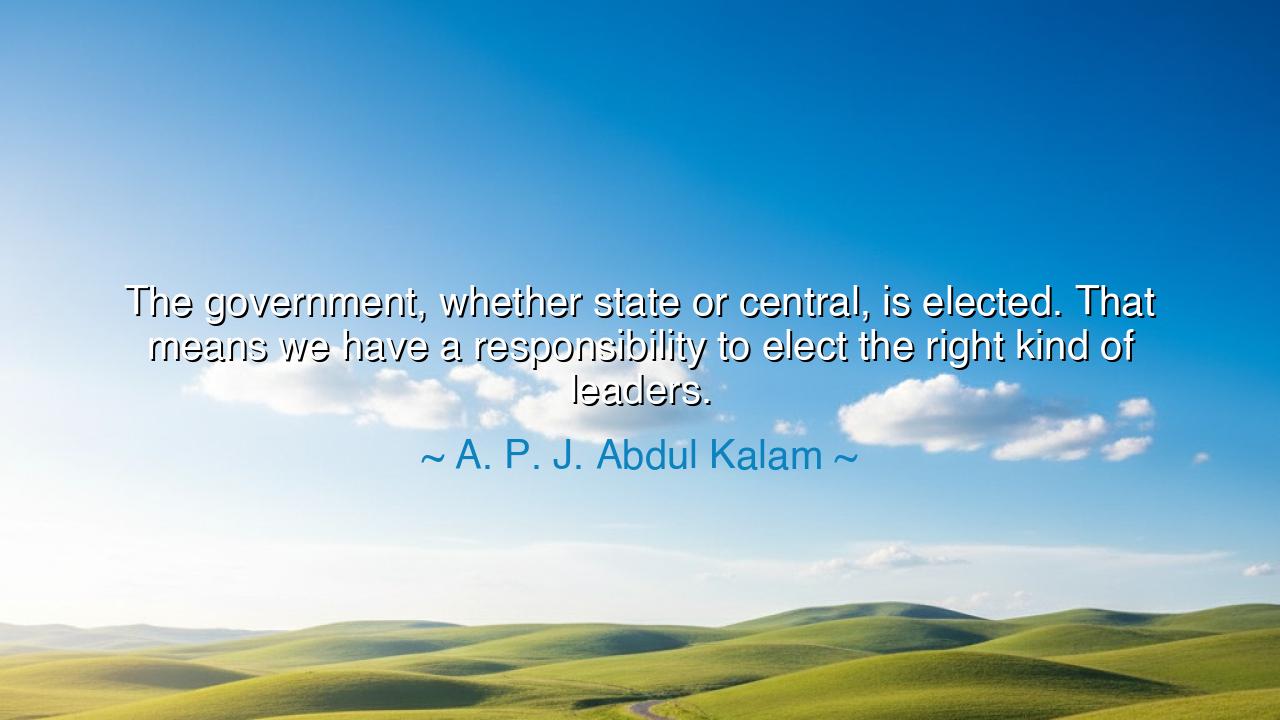
The government, whether state or central, is elected. That means
The government, whether state or central, is elected. That means we have a responsibility to elect the right kind of leaders.






"The government, whether state or central, is elected. That means we have a responsibility to elect the right kind of leaders." — A. P. J. Abdul Kalam
In this noble and illuminating declaration, A. P. J. Abdul Kalam, the “People’s President” and philosopher of modern India, speaks not merely of politics but of duty, of the sacred bond between citizen and state. His words remind us that government is not an alien force imposed upon the people; it is their own reflection — a mirror held up to the collective conscience of the nation. When he says that government is elected, he calls upon each of us to recognize our share in its creation. If leaders rise who are corrupt, indifferent, or unjust, it is not they alone who have failed — it is we, the people who chose them or allowed them to be chosen in our silence.
Dr. Kalam lived through the vast arc of India’s democratic journey — from the tremors of independence to the dawning of a scientific age. He had seen how power, when placed in the wrong hands, can wound a nation’s soul, and how the same power, wielded by the wise and selfless, can lift millions from despair. As a scientist, he had learned the discipline of cause and consequence; as a leader, he applied that truth to governance itself. If the government is the cause, the people are the creators. If the nation suffers, it is not by fate, but by choice. His words, spoken with quiet gravity, remind us that democracy is not merely the right to vote, but the responsibility to think, discern, and choose rightly.
This truth is as old as civilization itself. In the ancient republics of Greece, it was said that a city’s virtue lies not in its walls or riches, but in the wisdom of its citizens. Plato warned that when good men refuse to govern, they are condemned to be ruled by the wicked. And so it has been throughout history: where citizens grow complacent, demagogues rise; where people seek comfort over conscience, tyranny creeps in, clothed in the language of progress. Kalam’s warning is therefore not political, but moral — a reminder that liberty is sustained not by constitutions alone, but by the character of those who wield and those who grant power.
Consider the story of ancient Rome, once a republic of laws and civic virtue. In its early days, citizens gathered in the forum to debate, to vote, to hold their leaders accountable. But as centuries passed, the people surrendered their vigilance, seduced by spectacle and comfort. They elected men who promised bread and games rather than justice and wisdom. In time, the republic fell, and an emperor ruled where once free citizens had stood. Thus, a nation that had conquered the world could not save itself from its own indifference. So too does Kalam’s message echo through the ages: a nation’s greatness is not built in its palaces, but in the minds of its voters.
For when Kalam speaks of electing “the right kind of leaders,” he does not mean the cleverest or the most powerful, but the pure in heart, those guided by service rather than self. A true leader, in his vision, is one who uplifts rather than divides, who listens before commanding, who builds rather than blames. Such leaders do not arise by accident — they are chosen, nurtured, and supported by a people who share their vision. The ballot, in this light, is not a mere piece of paper but a sacred covenant, written in the ink of trust and sealed by the will of the people.
And yet, Kalam knew that responsibility begins long before the moment of the vote. To elect wisely, one must first think wisely. A nation cannot choose the righteous if its citizens themselves are careless, corrupt, or cynical. Education, awareness, and moral courage — these are the roots from which good governance grows. He urged the youth to question, to learn, to dream not merely of personal success, but of national progress. For he believed that when minds are enlightened, the vote becomes a weapon of justice, and democracy itself transforms from ritual into revelation.
Thus, O reader and listener, take these words as a call to conscience. The next time you look upon your leaders, remember that they are the mirror of your choices, the harvest of your care or neglect. If you would see greatness in your nation, plant it in the soil of your own heart — in honesty, diligence, and the courage to act. The ballot you hold is not a privilege granted by government; it is the power to shape destiny itself. Use it with wisdom, and you become the guardian of your nation’s soul.
Lesson: The quality of a government reflects the quality of its citizens. To elect the right kind of leaders, we must first be the right kind of people — informed, principled, and brave.
Practical Action: Educate yourself about the issues that shape your nation. Vote not for tribe, wealth, or charm, but for integrity and vision. Encourage others to do the same. Hold your leaders accountable, not through anger, but through wisdom and vigilance. For when the people rise in conscience, even the most powerful bow to truth — and the light of democracy shines pure once more.






AAdministratorAdministrator
Welcome, honored guests. Please leave a comment, we will respond soon